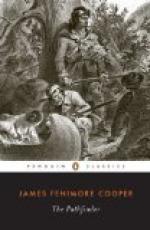“I know we are steering in the right direction at present,” returned the Sergeant; “but in the course of a few hours we shall be up with a headland, where we must feel our way with more caution.”
“Leave me to pump the man at the wheel, brother, and you shall see that I will make him suck in a very few minutes.”
Cap and the Sergeant now walked aft, until they stood by the sailor who was at the helm, Cap maintaining an air of security and tranquillity, like one who was entirely confident of his own powers.
“This is a wholesome air, my lad,” Cap observed, in the manner that a superior on board a vessel sometimes condescends to use to a favored inferior. “Of course you have it in this fashion off the land every night?”
“At this season of the year, sir,” the man returned, touching his hat, out of respect, to his new commander and Sergeant Dunham’s connection.
“The same thing, I take it, among the Thousand Islands? The wind will stand, of course, though we shall then have land on every side of us.”
“When we get farther east, sir, the wind will probably shift, for there can then be no particular land-breeze.”
“Ay, ay; so much for your fresh water! It has always some trick that is opposed to nature. Now, down among the West India Islands, one is just as certain of having a land-breeze as he is of having a sea-breeze. In that respect there is no difference, though it’s quite in rule it should be different up here on this bit of fresh water. Of course, my lad, you know all about these said Thousand Islands?”
“Lord bless you, Master Cap, nobody knows all about them or anything about them. They are a puzzle to the oldest sailor on the lake, and we don’t pretend to know even their names. For that matter, most of them have no more names than a child that dies before it is christened.”
“Are you a Roman Catholic?” demanded the Sergeant sharply.
“No, sir, nor anything else. I’m a generalizer about religion, never troubling that which don’t trouble me.”
“Hum! a generalizer; that is, no doubt, one of the new sects that afflict the country,” muttered Mr. Dunham, whose grandfather had been a New Jersey Quaker, his father a Presbyterian, and who had joined the Church of England himself after he entered the army.
“I take it, John — " resumed Cap. “Your name is Jack, I believe?”
“No, sir; I am called Robert.”
“Ay, Robert, it’s very much the same thing, Jack or Bob; we use the two indifferently. I say, Bob, it’s good holding ground, is it, down at this same station for which we are bound?”
“Bless you, sir! I know no more about it than one of the Mohawks, or a soldier of the 55th.”
“Did you never anchor there?”
“Never, sir. Master Eau-douce always makes fast to the shore.”
“But in running in for the town, you kept the lead going, out of question, and must have tallowed as usual.”




